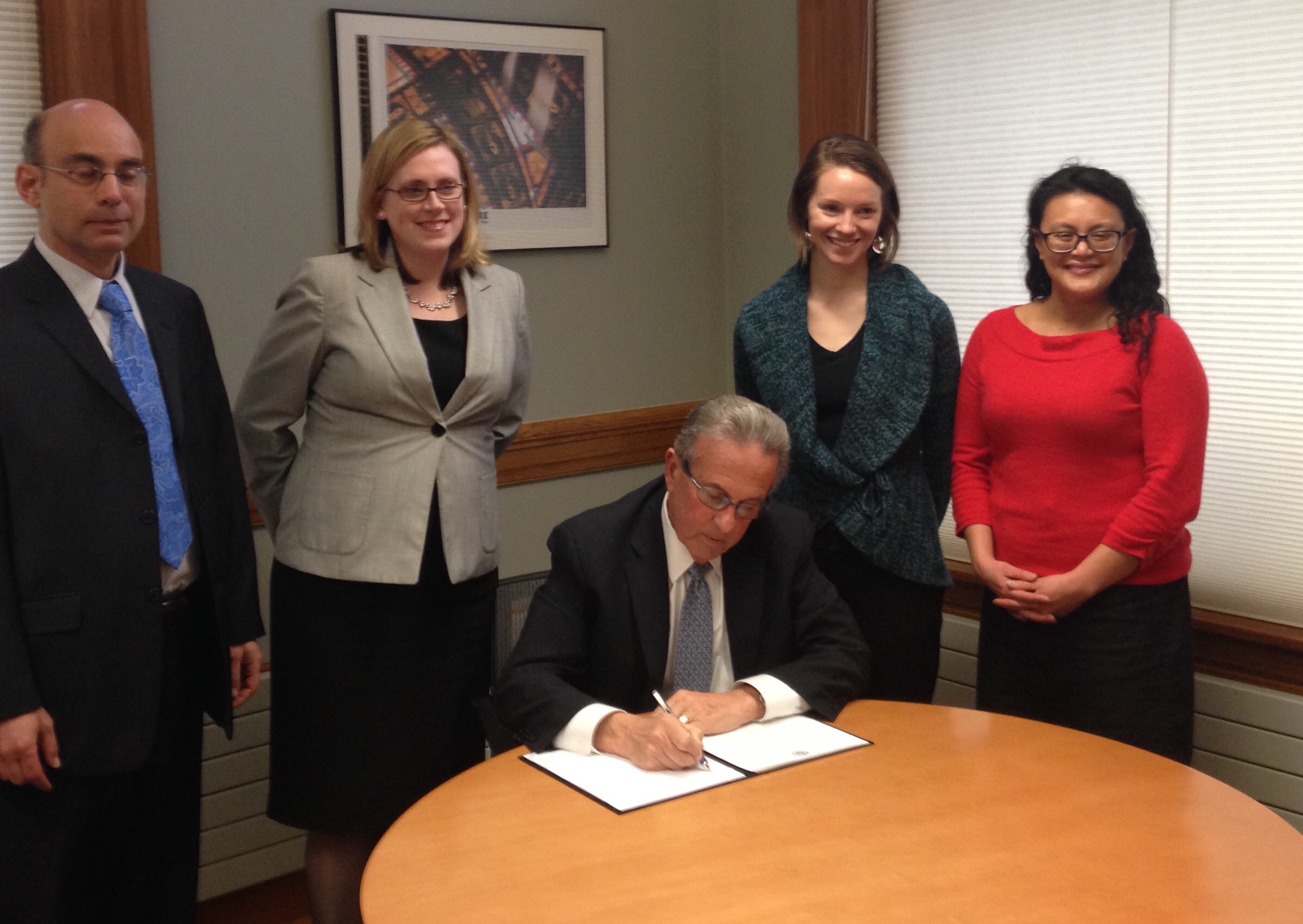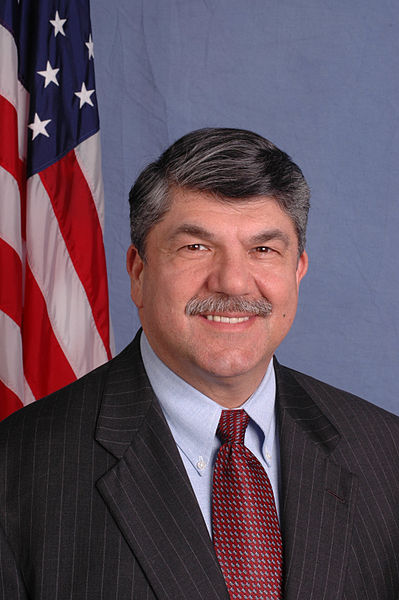Blog
Get Email Updates
Remembering the Impact of SAG-AFTRA President Ken Howard
SAG-AFTRA President Ken Howard passed away this week at the age of 71. AFL-CIO President Richard Trumka issued the following statement:
We mourn the loss of SAG-AFTRA President Ken Howard, and we honor his tremendous leadership built on unwavering dedication to the members he represented. Ken was a unifier, a true professional and a powerful voice for working people. From his roles as Thomas Jefferson to Tip O’Neill to the White Shadow, he leaves an indelible legacy. He will be greatly missed.
As a kid in the 1980s, I first caught Howard's groundbreaking show, "The White Shadow," in reruns. The show was a bold attempt, in 1978, to have a national conversation about race, poverty and a variety of social problems. With a cast that has more diversity than most shows now, "The White Shadow" was unafraid to tackle tough issues and to bridge racial divides that we still face today. It's hard to imagine being the person I am today without the deep thoughts and study the show inspired in me. And Howard spent the rest of his life fighting on behalf of working people, another pathway down which I later found myself following in Howard's footsteps. Thanks for the inspiration, Ken.
Read SAG-AFTRA's full release on Howard's life and accomplishments on behalf of working families.
AFL-CIO Joins International Mission Demanding Accountability and Human Rights Protections in Honduras
On March 3, human rights activists denounced the assassination of Berta Cáceres, a leader for indigenous rights and environmental justice with the Council of Indigenous and Popular Organizations of Honduras (COPINH). The Ides of March in Honduras demonstrated once again that the shocking level of violence against activists since the 2009 coup—with some 200 murdered—has reached crisis proportions.
A second COPINH leader, Nelson Noé García, was murdered after a forceful eviction on March 15. That same day, the president of Unified Campesino Movement of the Aguán, another indigenous group, was briefly arrested on questionable charges; Cristián Alegría, a campesino activist, was shot at; and David Romero, a journalist critical of the government, was sentenced to 10 years in prison—all while Gustavo Castro, a Mexican activist who witnessed Cáceres’ murder, has been prevented from leaving the country.
Targeted murders of activists and dissidents are not unusual in Honduras, though the international indignation recent assassinations have spurred may mark a new moment for civil society demands for justice and an end to impunity for those committing violence. Trade unionists also are often targeted for organizing and exercising their basic rights. Over the past 12 months, the Solidarity Center has documented 15 incidents of threats or violence against union activists.
To support the struggle in Honduras, the AFL-CIO joins the National Workers Union of Mexico and the Trade Union Confederation of the Americas in seeking accountability from the government of Honduras for the assassination of Cáceres and others. The U.S. government must play a key role in pressuring the government of Honduras. The United States must recognize the broad significance of this assassination and call for:
- An independent international investigation of Cáceres’ murder;
- Rapid and effective protection measures for Cáceres’ family, members of COPINH and Castro;
- A review of U.S. assistance to Honduran security forces and rigorous use of human rights standards;
- A full and immediate stop to the Agua Zarca dam project Cáceres fought against; and
- Support for a protection system for Honduran activists and human rights defenders.
In its February 2016 report (English/Spanish), the AFL-CIO made clear its deep concerns with human rights and sustainable development in Honduras after an October 2014 labor delegation met with a broad range of labor and community organizations, the Honduran government and the U.S. Embassy. In the report, the delegation made a broad range of recommendations to improve the security and labor rights environment in the country.
Gender Equality
Report: Working Women in the U.S. Have Less than 40 Minutes of Personal Time a Day
A new report released by the AFL-CIO reveals that more than half of working women spend less than four hours a week on themselves after fulfilling their work and caregiving responsibilities. The report is based on the results of a survey on women, which received nearly 25,000 responses from union and nonunion women across the country.
"This survey offers a telling glimpse into the issues that matter most to America’s working women," said AFL-CIO Secretary-Treasurer Liz Shuler. "As a woman and a union member myself, I understand the constant balancing act that many women are forced to play. I also know that union membership opens doors to leadership opportunities and economic power for women."
The AFL-CIO launched the National Survey of Working Women last fall in an effort to gain a multifaceted picture of American women. Shuler released the survey results today alongside local working women, the AFL-CIO Women’s Committee and Reps. Rosa DeLauro (D-Conn.), Bobby Scott (D-Va.), Lois Frankel (D-Fla.) and Doris Matsui (D-Calif.).
"As a single parent, being a part of UFCW has made life for my family and I so much more secure," said Kim Mitchell of United Food and Commercial Workers Local 400. "I am not a faceless employee. I have a voice—a voice I wouldn’t have if I didn’t belong to a union. As a union member, I am somebody."
The results included critical information about women voters for presidential candidates on both sides of the aisle. Women, who comprise a critical voting bloc, reported being most concerned with the issues of affordable health care, equal pay, affordable higher education and raising the minimum wage.
DeLauro said:
Millions of American women are juggling work and family responsibilities, and it is not getting any easier. From equal pay and an increased minimum wage to affordable health care and paid leave, nearly 25,000 working women have made their voices known in this survey and spoken on the issues that can help families succeed. Now, it is up to Congress to listen and to enact legislation that makes the workplace a better place for all women. We can start by passing the FAMILY Act, to guarantee paid family and medical leave for all employees, and the Healthy Families Act, to allow workers have access to job-protected paid sick days. The time to act is now. The American worker deserves nothing less.
The survey revealed that 59% of women fill the role of primary breadwinner in their household and that women view health care costs and low wages as major barriers to their economic stability.
Scott said:
The results of the National Survey of Working Women reflect what I have been hearing from working women all across the nation: They are working harder than ever but still can’t make ends meet, too many are forced to make an impossible choice between caring for their families and providing for them, and pay discrimination makes it impossible to just break even, let alone get ahead. The good news is that joining a union is one of the surest ways that workers can raise their pay and secure benefits like paid leave and fair work schedules. That’s why I introduced the Workplace Action for a Growing Economy Act, to strengthen women’s ability to speak up together and to help them make a better life for themselves and their families.
In addition to being the breadwinner and financial decision maker for their families, the survey found that more than 25% of women spend over 30 hours a week on caregiving activities.
The other members of Congress also weighed in on the report. Matsui said:
Women know how to get things done – whether at home or in the workplace. Yet, as the AFL-CIO’s survey clearly demonstrates, too often women are stretched between the responsibilities of childcare, caring for aging loved ones, and their increasingly expanded role in the American workforce. It is past time we update our outdated policies to reflect the realities that women face today, and elevate the economic issues facing women in America.
Frankel added: "Women are both breadwinners and caregivers in a growing number of households. This report shows how critical closing the gender gap is for America’s working families. It’s time for this country to make women’s equality more than a slogan and enact meaningful paycheck fairness policies."



